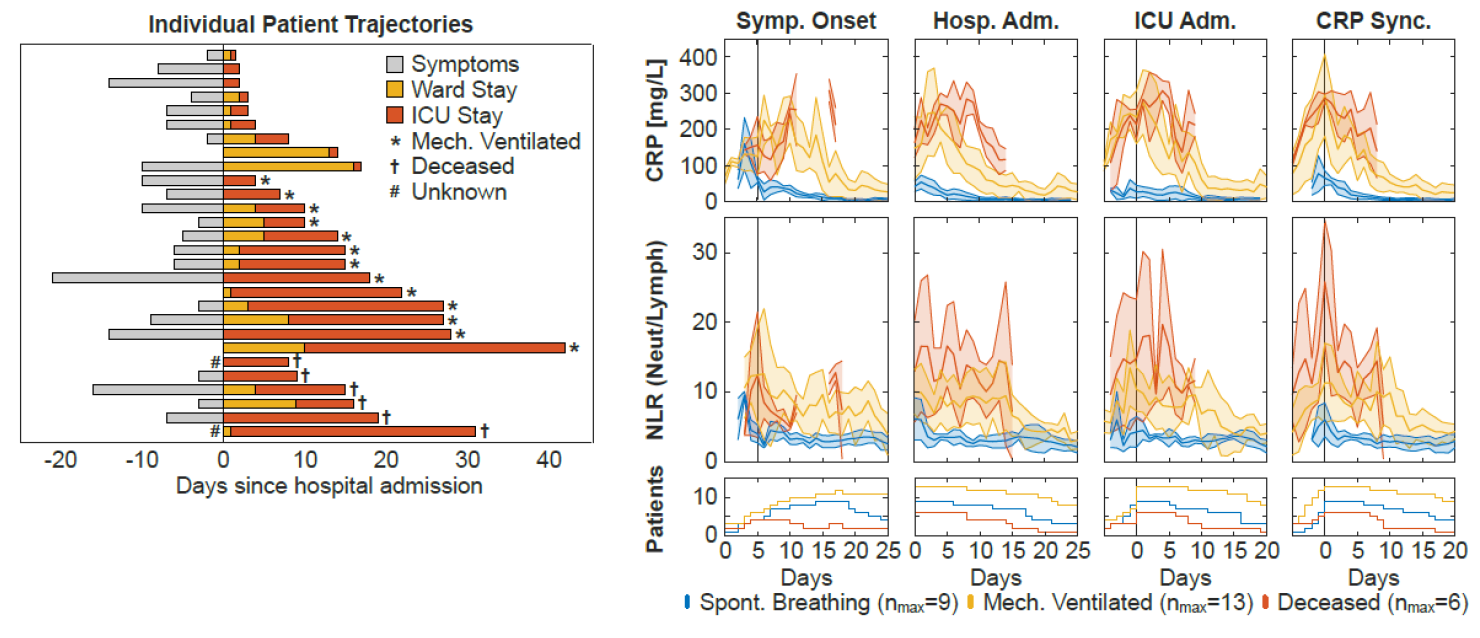Research partner
- Medical Informatics, University of Zurich
- Leonhard Med, ETH Zurich
- Institute for Applied Simulation, ZHAW
Big Data, Data Science and Artificial Intelligence in Intensive Care Medicine.
Since the introduction of a patient data management system (PDMS) in 2017, healthcare data routinely collected at the Institute has been archived electronically. This includes treatment data such as medication use and ventilation parameters, as well as physiological data such as oxygen saturation, heart rate, and blood pressure. The PDMS we use allows all relevant parameters to be recorded once per minute. With the consent of the patients and the cantonal ethics committee, these extensive data sets are also available for research projects. By using specially protected high-performance computers and self-learning algorithms, it is possible to investigate these data with regard to a wide range of intensive care issues.
The dynamics of life processes arise from the interaction of physical, chemical and biochemical processes in an organism, and the interaction of the organism with the outside world. The physiological dynamics of a single vital parameter observed by medicine, such as the change in blood pressure over time, therefore reflects the processes of a highly complex system. Changes in dynamics during illness and recovery can provide important clues to the underlying structure of the system. With deeper knowledge of the structure, in turn, appropriate therapies could be developed and improved.
Since the Corona pandemic at the latest, we have been a virtual, dislocated team of experts. The secure virtual desktop infrastructure at the University Hospital allows us to continue our research without restrictions from the home office. If you are interested in a scientific collaboration, conducting a PhD or Master thesis, or if you would like to support our work financially, please contact Dr. Bartussek.
How to Synchronize Longitudinal Patient Data With the Underlying Disease Progression: A Pilot Study Using the Biomarker CRP for Timing COVID-19

The continued digitalization of medicine has led to an increased availability of longitudinal patient data that allows the investigation of novel and known diseases in unprecedented detail. However, to accurately describe any underlying pathophysiology and allow inter-patient comparisons, individual patient trajectories have to be synchronized based on temporal markers. In this pilot study, we use longitudinal data from critically ill ICU COVID-19 patients to compare the commonly used alignment markers „onset of symptoms“, „hospital admission“ and „ICU admission“ with a novel objective method based on the peak value of the inflammatory marker C-reactive protein (CRP). Our data highlights that proper synchronization of longitudinal patient data is crucial for accurate interpatient comparisons and the definition of relevant subgroups. The use of objective temporal disease markers will facilitate both translational research efforts and multicenter trials. Authors: Martina A Maibach, Ahmed Allam, Matthias P Hilty, Nicolas A Perez Gonzalez, Philipp K Buehler, Pedro D Wendel Garcia, Silvio D Brugger, Christoph C Ganter, Michael Krauthammer, Reto A Schuepbach, Jan Bartussek, RISC-19-ICU Investigators
If you are interested in writing a master’s or doctoral thesis with us, please contact:
Jan Bartussek Dr. Sc. ETH